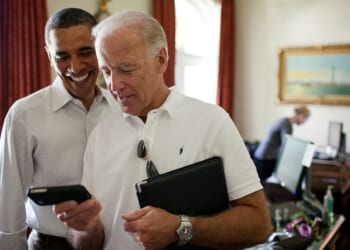In a striking turn of events, several senior banking executives have broken their long-standing silence, revealing that political coercion, not just regulatory prudence, steered decisions about whose bank accounts to close and services to deny.
Their admissions come on the heels of President Donald Trump’s executive order, Guaranteeing Fair Banking for All Americans, issued on August 7, 2025, which explicitly outlaws politicized or unlawful debanking and prohibits the nebulous use of “reputational risk” as justification for denying service.
Until now, institutions like JPMorgan, Bank of America, CitiGroup, and PNC have staunchly defended their practices, insisting that account closures rested solely on objective criteria. But in an extraordinary shift, these same banks through unnamed executives quoted by Fox News Digital have now voiced concerns about the “very, very real” pressure they felt from federal regulators under the Obama and Biden administrations.
Skeptics will note that these executives are speaking off the record, and that Fox News is currently the only outlet reporting their claims. Even so, the account is credible because it tracks with a broader pattern of government influence over private industry. We already know that federal agencies leaned on Big Tech companies to stifle conservative voices online. It would not be a stretch to see the same pressure applied to America’s financial institutions behind closed doors. (RELATED: BOB RUBIN: Woke Banks Are Cancelling Americans – Here Is How They Should Fight Back)
One executive put it plainly: “When your regulator gives you a suggestion, it’s not a suggestion, it’s an order.” The practice, they say, escalated through initiatives like Operation Choke Point and its modern iteration, which encouraged banks to distance themselves from entire industries deemed “high risk.” Under the looming shadow of regulatory scrutiny, banks relied on reputational risk as cover to close accounts, often targeting conservatives, religious organizations, firearms dealers, crypto firms, and energy companies.
This admission shatters the public posture that banks were victims of baseless political smears. Instead, they now acknowledge that political context shaped decisions that remained hidden from public view. “When there’s ambiguity in the law, beauty is in the eye of the beholder,” said one executive, and for years the beholder was the Obama and Biden regulators.
What makes this confession so powerful is its timing. It follows Trump’s executive order aiming to strip political bias from banking guidance, requiring institutions to reinstate unlawfully de-banked customers and tasking regulators with enforcement, from fines to Department of Justice referrals. Already, lawmakers like Rep. Andy Barr of Kentucky are rushing to codify the order in law by targeting structures like reputational risk through bills such as the Fair Access to Banking Act and the FIRM Act.
But we must ask: why now? Is this delayed confession prompted by genuine contrition, or is it strategic shielding? Clearly, the weight of Trump’s order has yet to fully reveal itself. For now, however, we are witnessing a rare moment when financial titans admit that politics, not just profit or prudence, influenced banking decisions.
This is more than political theater. It is a warning. Formalizing fair-banking protections in law should be urgent. Executive orders can be reversed, while legislation endures. Without binding statutes, banks may revert to the old playbook under future regulators, shielding themselves once again behind ambiguous standards.
Moreover, Trump’s own complaints of being “debanked” by major institutions, echoed by First Lady Melania’s claims in her memoir, bring personal resonance to the debate. But they also raise questions about intertwining personal grievance with policy.
The road ahead is complicated. Retail banks typically argue they must manage risk, including reputational risk, and that they have the constitutional freedom to choose customers under anti-discrimination laws, assuming no protected class is involved. Indeed, Reuters reports that in CFPB records from 2012 onward, only 35 of over 8,300 complaints cited “political or religious bias” as the cause for debanking. That raises doubts about the scope of confirmed cases.
Nevertheless, that small number does not validate the practice. It reflects the difficulty of proving a bank’s internal logic and exemption track records. Reputational risk has for years provided plausible deniability.
Now, the banks themselves have pierced that veil. Executives have acknowledged that political pressure reigned, even without formal memos or court orders. And in the name of transparency and perhaps redemption, they are giving us a rare inside glimpse of how regulatory coercion blurs the line between public policy and private banking decisions.
The consensus must be clear. Banking access should not depend on ideology or affiliations. Risk assessments must be real, objective, and individualized. Regulators must be guardians, not political operatives. And most critically, these protections require permanent codification, not fragile reliance on shifting executive priorities.
In that moment of confession, Wall Street does not want to be your political clearinghouse. We owe it to the promise of free society to make that notion not just a promise but law.
William Flaig is the CEO and Co-Founder of the American Conservatives Values ETF (ACVF). Learn more at https://investconservative.com/
The views and opinions expressed in this commentary are those of the author and do not reflect the official position of the Daily Caller News Foundation.
All content created by the Daily Caller News Foundation, an independent and nonpartisan newswire service, is available without charge to any legitimate news publisher that can provide a large audience. All republished articles must include our logo, our reporter’s byline and their DCNF affiliation. For any questions about our guidelines or partnering with us, please contact licensing@dailycallernewsfoundation.org.




![Steak ’n Shake Mocks Cracker Barrel Over Identity-Erasing Rebrand [WATCH]](https://www.right2024.com/wp-content/uploads/2025/08/Steak-n-Shake-Mocks-Cracker-Barrel-Over-Identity-Erasing-Rebrand-WATCH-350x250.jpg)




![Mount Rushmore Could Get Trump Upgrade Under GOP Push [WATCH]](https://www.right2024.com/wp-content/uploads/2025/07/Mount-Rushmore-Could-Get-Trump-Upgrade-Under-GOP-Push-WATCH-350x250.jpg)
![Soros Network, Others Behind LA Riots [WATCH]](https://www.right2024.com/wp-content/uploads/2025/06/Soros-Network-Others-Behind-LA-Riots-WATCH-350x250.jpg)





